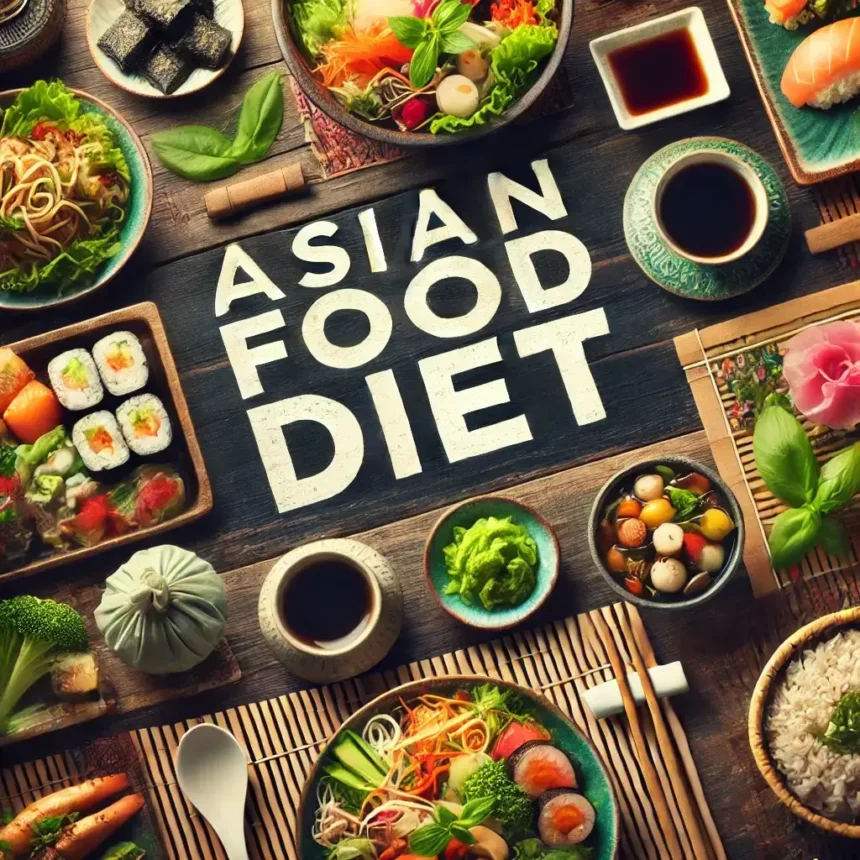The Asian food diet is one of the healthiest ways to nourish your body and maintain a balanced lifestyle. Rooted in centuries-old culinary traditions, the diet incorporates a diverse range of fresh ingredients, full of flavours and nutrients, to enhance well-being. From the sushi of Japan to the curries of India, the Asian diet plan offers countless options that promote a healthy body and mind. But it’s more than just delicious—it’s a way of eating that can support weight loss, heart health, and even digestion. Let’s explore the core principles of healthy Asian food and how you can benefit from it.
What is the Asian Food Diet?
The Asian food diet is a holistic approach to eating that emphasizes balance, variety, and moderation. It focuses on fresh vegetables, lean proteins, whole grains, and healthy fats—key components found in traditional Asian cuisine. Unlike many Western diets that rely heavily on processed foods, the Asian diet plan encourages cooking meals from scratch with wholesome ingredients. The idea is not to restrict yourself but to eat in a way that supports the body’s natural functions while enjoying the foods you love.
Asian food diet: What’s on Your Plate?
The beauty of healthy Asian food lies in its variety. Different countries within Asia have their traditional foods, but they share common principles of nutrition. Here are a few of the main ingredients in healthy Asian food:

Rice and Noodles
Rice is a staple in many Asian cultures, and varieties like brown rice or jasmine rice are often favoured over refined grains. Noodles, whether made from rice, wheat, or buckwheat, also feature prominently in Asian cuisine.
Fresh Vegetables
Leafy greens like bok choy, spinach, and napa cabbage, as well as colourful veggies like carrots and bell peppers, are often found in stir-fries and soups.
Lean Proteins
Fish, tofu, tempeh, and chicken are commonly consumed, providing high-quality protein that’s easy for the body to absorb.
Herbs and Spices
Garlic, ginger, turmeric, and cilantro are not only used to flavour dishes but also offer various health benefits, including anti-inflammatory properties.
The Asian Diet Plan: A Simple Approach to Healthy Eating
An Asian diet plan focuses on making meals that are both nutritious and satisfying, with plenty of plant-based ingredients, healthy fats, and lean proteins. The goal is to strike a balance between macronutrients, keeping meals varied without overloading on any one food group.
How to Structure Your Meals
Fill Up on Vegetables: Make vegetables the star of your plate. In many Asian cultures, vegetables often take centre stage, with meat or seafood used in smaller portions as a complement.
Add Protein: Fish, tofu, and chicken are common sources of protein. These provide essential amino acids to help maintain muscle mass while being relatively low in fat.
Whole Grains: Incorporate whole grains like brown rice, quinoa, or barley into your meals. These provide energy, fibre, and essential nutrients, helping to keep you full longer.
Healthy Fats: Fats from coconut oil, sesame oil, and fatty fish like salmon contribute to heart health and maintain balanced hormone levels.
By following this structure, you’ll enjoy nutrient-rich, balanced meals that support overall health and energy.
Traditional Asian Foods: Nourishing the Body
One of the best aspects of the Asian food diet is the range of traditional Asian foods that have stood the test of time for their nutritional value. Here are some favourites:
Kimchi (Korea)
This fermented vegetable dish is packed with probiotics that support gut health and digestion. Kimchi also offers a boost of fibre and essential vitamins.
Miso Soup (Japan)
Made from fermented soybeans, miso soup is a great source of probiotics and can improve digestion. It’s also rich in vitamins and minerals like manganese and copper.
Pho (Vietnam)
A fragrant broth-based noodle soup that’s both light and nourishing, pho is commonly served with fresh herbs, lean meats, and rice noodles.
Curry (India)
Spices like turmeric, cumin, and coriander make Indian curries not only delicious but also anti-inflammatory and rich in antioxidants.
Asian Food for Weight Loss: A Delicious Way to Shed Pounds
The Asian food diet can also be effective for weight loss. The key is that it emphasizes smaller portions, fresh ingredients, and cooking methods like steaming and stir-frying, which retain the nutrients in the food without adding excessive fats.
Tips for Losing Weight with an Asian Diet Meal Plan:
Portion Control: Meals are often served in smaller portions compared to Western meals, making it easier to control calorie intake.
Focus on Fiber: The Asian food diet is rich in fibre from vegetables, rice, and legumes, which helps with digestion and keeps you feeling full longer.
Minimize Sugar: Unlike many Western diets that are packed with processed sugars, Healthy Asian food focuses on naturally sweet foods like fruit and honey.
Incorporate More Plant-Based Meals: Meals that centre around tofu, tempeh, and vegetables are not only healthy but lower in calories, making them ideal for weight management.
Benefits of the Asian Diet: More Than Just Weight Loss
There are numerous benefits of the Asian diet, extending beyond just weight loss. Here are a few of the key health advantages:
Boosted Digestion
Many traditional Asian foods like kimchi and miso are fermented, which means they’re packed with beneficial bacteria that support healthy digestion and gut flora.
Reduced Inflammation
The herbs and spices common in Asian cuisine—like ginger, garlic, and turmeric—are known for their anti-inflammatory properties. Reducing inflammation can lead to better joint health, improved immune function, and a lowered risk of chronic diseases.
Balanced Blood Sugar
The high fibre content of Asian food for weight loss, combined with its focus on whole grains and vegetables, helps maintain stable blood sugar levels. This can be particularly beneficial for those at risk of diabetes.
Improved Heart Health
With its emphasis on fish, healthy fats, and fibre, Healthy Asian food can help lower cholesterol levels and reduce the risk of heart disease.
Conclusion
The Asian food diet offers a delicious and nutrient-rich way to improve your health. By incorporating fresh vegetables, lean proteins, whole grains, and healthy fats into your meals, you can enjoy a wide range of health benefits. Whether you’re looking to lose weight, improve digestion, or support heart health, Healthy Asian food provides a balanced approach that’s sustainable and enjoyable. Embrace the healthy Asian food lifestyle, and discover how it can transform your wellness.
Check out our collection: Blood Type B Food Diet


